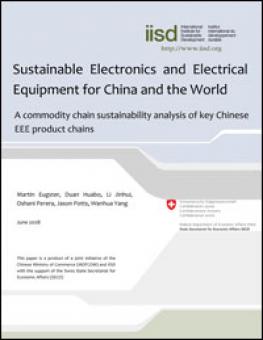
Sustainable Electronics and Electrical Equipment for China and the World: A commodity chain sustainability analysis of key Chinese EEE product chains
Since its entry into the World Trade Organization (WTO) in 2001, China's e-product manufacturing sector has entirely reoriented itself from an industry driven primarily by domestic markets to a fundamentally export-driven sector and the world's most important supplier of many, if not most, major e-products on the market today. Perhaps not surprisingly, the single most important environmental impacts arising from e-products are associated with energy use. Both the manufacturing and use phases of e-products are highly energy intensive. At a more local level, the manufacture, recycling and disposal of e-products present serious threats to personal and community safety through the heavy metals and chemicals used in processing and production. China's special role as the world's leading destination for foreign e-waste, combined with its vast system of informal e-waste recycling and disposal, presents both an environmental challenge and opportunity.
Based on our analysis of the social and environmental impacts of e-products, both within China and abroad, basic areas for improvement can be identified that provide a baseline set of objectives for any policy action aimed at attaining improved sustainability across the sector. These include improved management and handling during e-product manufacture, e-waste collection, dismantling and disposal and improved design for the reduction of energy and resource use (both during production and use phases) and the maximization of recyclability (eco-design).
The main challenge facing Chinese (and international) policy-makers in this context is the identification of effective mechanisms for stimulating the efficient adoption of such improvements without jeopardizing the economic growth needed to maintain economic development. Building on the existing policy framework and related private initiatives both nationally and internationally, this report proposes policy action along two complementary trajectories: the reinforcement of regulatory measures and the expansion of market-based measures.
Additional downloads
You might also be interested in
December 2024 | Carbon Minefields Oil and Gas Exploration Monitor
In November 2024, 23 oil and gas exploration licences were awarded across five countries, with Russia granting the licences that account for the largest portion of embodied emissions.
Toward a Coherent, Transformative Approach to Financing Sustainable Development, Climate, and Nature
Four key proposals for the Fourth Financing for Development Conference (FfD4) to create an integrated, equitable approach to financing climate, nature, and development goals.
Green Public Procurement in India
This report analyzes the status of green public procurement (GPP) in India and suggests key strategies for advancing sustainable procurement practices.
Sustainable Asset Valuation (SAVi) of a Small-Scale Tree Planting Initiative in Côte d'Ivoire
This report analyzes the social, economic, and environmental outcomes of a small-scale tree planting initiative at schools in Côte d'Ivoire.